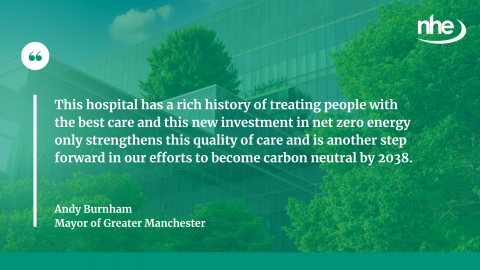In what will be another huge stride towards sustainability targets, Manchester University NHS Foundation Trust’s (MFT) Trafford General Hospital is set to become the first retrofitted carbon net zero inpatient hospital in the UK thanks to £18.9m of Public Sector Decarbonisation Scheme funding.
Approximately £10m will be used to revamp the hospital’s energy infrastructure, which is thought to be more than 50 years old. Effectively ending the hospital’s reliance on fossil fuel natural gas, MFT leaders will invest in modern low-carbon air and water source heat pump systems. The move represents the first time an existing NHS hospital has upgraded its entire energy system to completely decarbonise energy at the inpatient site.
Group CEO at MFT, Mark Cubbon, hailed the move as he said the project will make a “significant contribution” to Greater Manchester’s ambition to reach net zero targets ahead of the national deadline.
“For our patients, staff and communities, this will mean knowing that the facilities which they rely on every day are also a key part of our work to improve the environment for everyone, helping address the wider causes of poor health and tackling inequalities,” said Cubbon.
“Trafford Hospital has an incredible heritage, and we are incredibly proud that it will once again be making history by helping to preserve the planet for future generations.”

Trafford Hospital was the first NHS hospital opened by Aneurin Bevan in 1948, making it the birthplace of the health service. Greater Manchester mayor, Andy Burnham, said: “This investment in Trafford Hospital is great news for the residents of Trafford and beyond as state-of-the-art technology is brought to the hospital.
“This hospital has a rich history of treating people with the best care and this new investment in net-zero energy only strengthens this quality of care and is another step forward in our efforts to become carbon neutral by 2038.”
Ultimately, the project is expected to cut the site’s energy-associated carbon emissions by 92% by 2040, as well as save up to £100k per year based on current energy costs. Construction is scheduled to begin this autumn, with the design phase of the project set to start shortly. The work will take around two years to complete, with the new system slated for a spring 2026 launch.
Read about some of the latest innovators in the net zero space in the latest edition of National Health Executive’s digital magazine.
Image credit: iStock



















